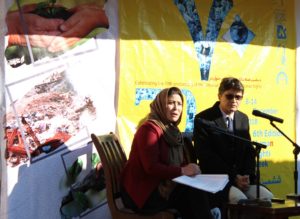Monday, 10 December 2018
Armanshahr Foundation, in collaboration with Afghanistan Women’s News Agency, Afghanistan Democracy and Development Organisation and the “Green Home” Influential Women and Youth Organization, held a public dialogue conference with the title of “What went on in Geneva Conference? People were absent,” at the premises of the “Green Home” Influential Women and Youth Organization on Monday, 10 December 2018.
Scores of civil rights activists, human rights and women’s rights defenders, cultural activists and students attended the conference.
Ms Forouzan Mashal, director of the Public Awareness Time Hour Organization, and Ms Lia Javad, director of the Feminine Solidarity for Justice Organization, who represented Afghanistan’s civil society in the Geneva Conference in Switzerland, reported to the meeting about the achievements and basic contents of that Conference.
Mr Abdullah Ahmadi, director of Afghanistan Democracy and Development Organisation and moderator of the meeting, welcomed the participants and the panellists. He said: “The Geneva conference was held on 28-29 November 2018, hosted by Afghanistan and the United Nations in Geneva, Switzerland. The peace process, security, continuation of aid by the international community to Afghanistan, empowerment of women, human rights and refugee rights were the important topics of discussion at the Conference.
“The government of Afghanistan has committed itself under Resolutions 1325, 1820 and 2106 of the United Nations Security Council to protect women against sexual and gender-based violence in conflicts and to facilitate their effective participation in peace and security processes. We hope that the commitments made by the government and the international community at the Geneva Conference to provide security, justice and peace shall be fulfilled. However, those commitments shall be fulfilled if citizens and the civil society remain active, engage in advocacy work and follow up on the commitments of the government and the international community.”
Speaking on the basic contents of the Geneva conference, positions of the civil society on peace and women, its interpretations, challenges and recommendations to the Geneva Conference, Ms Forouzan Mashal said: “The position of the civil society was that women must participate in the peace process and Afghanistan’s achievements regarding women must not be ignored. The other thing that we demanded was that the government of Afghanistan should not ignore the position of the civil society and in particular its monitoring role in any of their processes.
“The government of Afghanistan committed itself at the Geneva Conference to provide for security and peace, improve the political and economic conditions and strengthen the private sectors by 2020.”
Ms Mashal said that she and her colleague were planning to formulate a plan to monitor the implementation of the government’s commitments at the Geneva Conference and would share it with the people when it was ready.
Rights of migrants was one of the important topics at the Geneva Conference. Rights of migrants, refugees and the internally displaced people is one of the biggest challenges for the government of Afghanistan and constitute an international topic of discussion. Ms Lia Javad was invited to discuss factors causing people to migrate to European countries, the increasing figures of migration from Afghanistan, and the failure of the international organisations and host countries to address the rights of refugees from Afghanistan based on their commitments under international law and their obligations.
The essence of Ms Javad’s address was: The government is incapable of providing security to the people and insecurity is the most important factor causing migrants to leave their country. In recent years, some government officials who have failed to provide for security, have alleged that Afghans mostly migrate not because they are forced to but because of they are capricious. Asylum seekers, however reject this claim and say that they wished to invest in the country to combat unemployment and to avoid the disintegration of their families, but insecurity persuaded them to migrate.
Ms Javad added: “War and insecurity, unemployment, economic problems, job insecurity in various offices and departments are the most important factors of migration. Furthermore, religious, political, social and economic problems, the powerful Mafia, conflicts between organisations and lingual conflicts, the failure of various departments to recruit people based on their merits are other factors that prompt migration. In urban centres, merited young people lacking good contacts to the powerful Mafia are rarely recruited. In the provinces, young people face serious threats from the Taleban, ISIL and unaccountable armed groups, who prompt specialised and merited young people to flee Afghanistan.
“We ask the European Union to carry on their humanitarian aid and cooperation in previous years, to take promising decisions and to help refugees.”
In conclusion, a number of participants asked questions to the panellists, who responded in turn.
After the meeting, the newly published titles of Armanshahr were distributed among the participants, including Silence (an anthology of stories, Alice Munro), The Remains of the Day (Kazuo Ishiguro), The Land of Green Plums” (Herta Müller), My Ideal City (illustrated selection of drawings by children for the 5th International Simorgh Peace Prize). Armanshahr has printed more than 200,000 copies of different titles on human rights, women, transitional justice, literature and children’s literature over 12 years in Afghanistan, which have been donated to libraries, universities, civil society institutions, students, cultural activists and writers.
Since 2013, Armanshahr Foundation has been organising the “Human Rights Week” at the beginning of December, marking the International Human Rights Day, by holding educational workshops, public conferences, cultural and artistic events with the aim of raising the capacity of civil society institutions and promoting the culture of respect for human rights.


